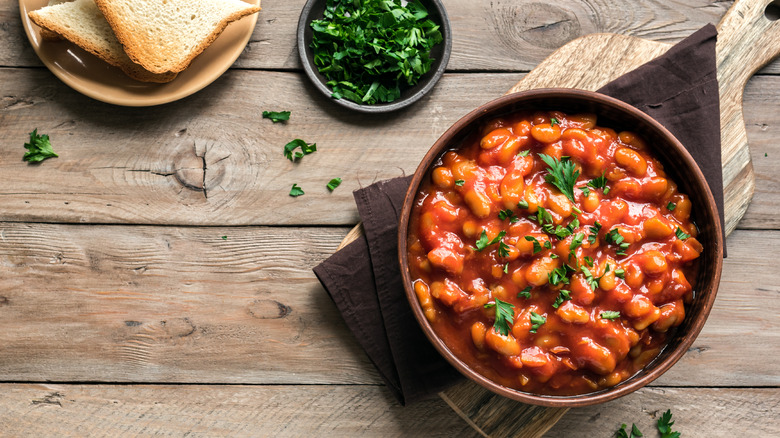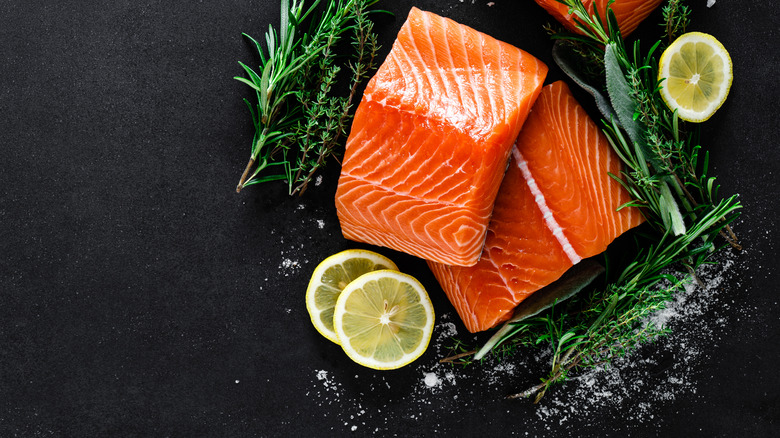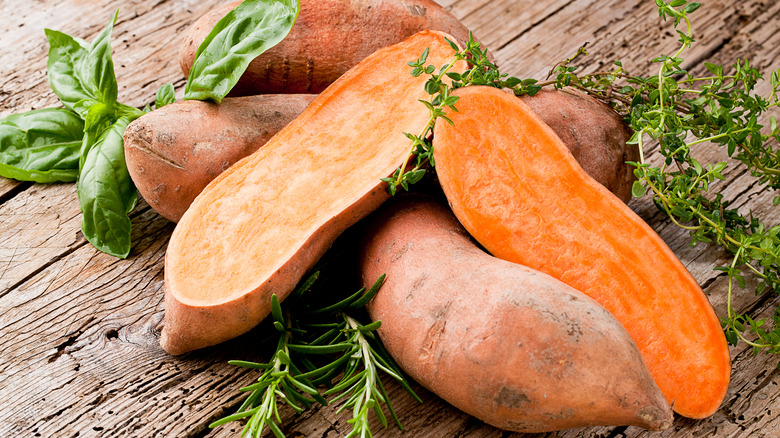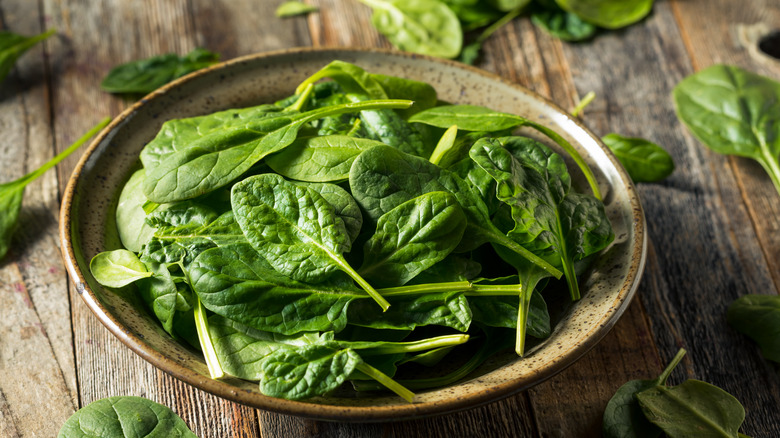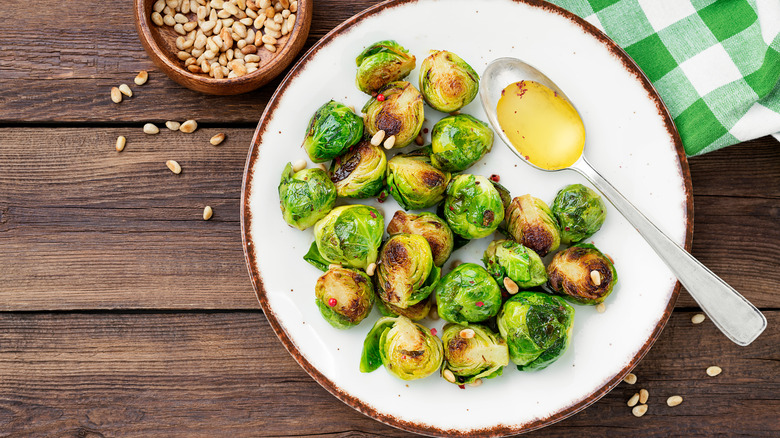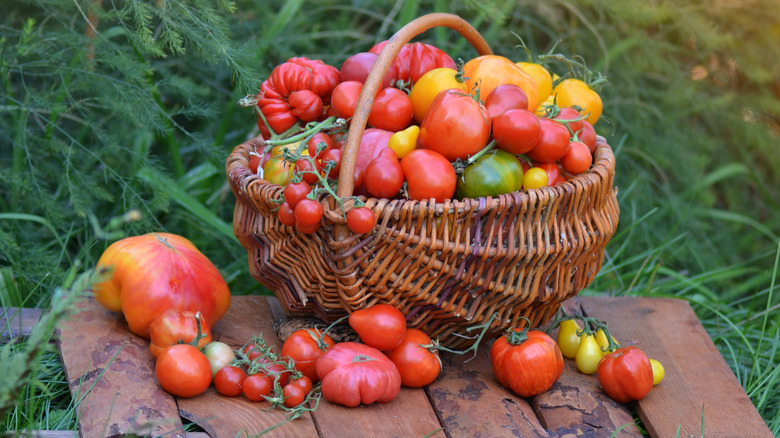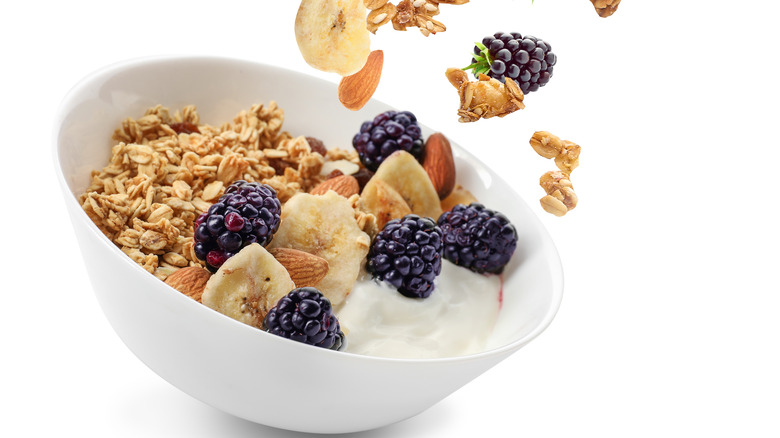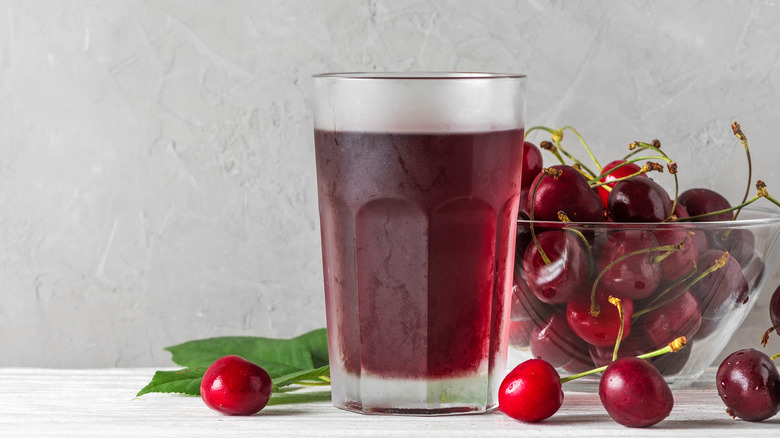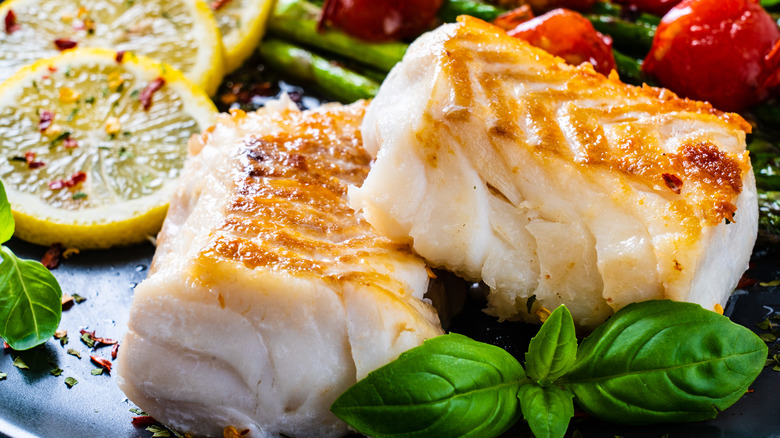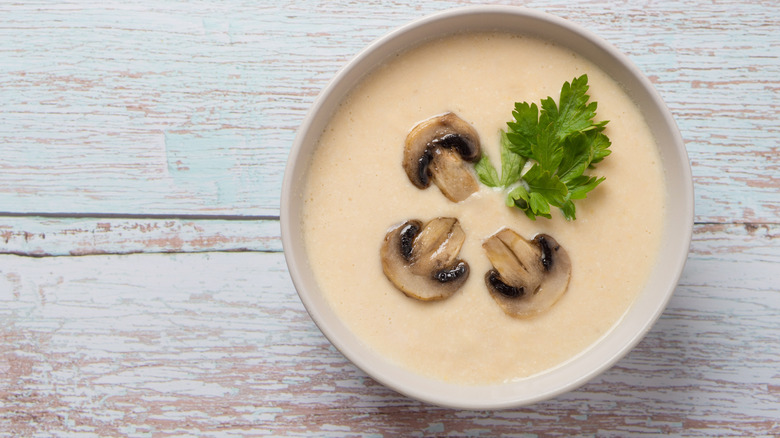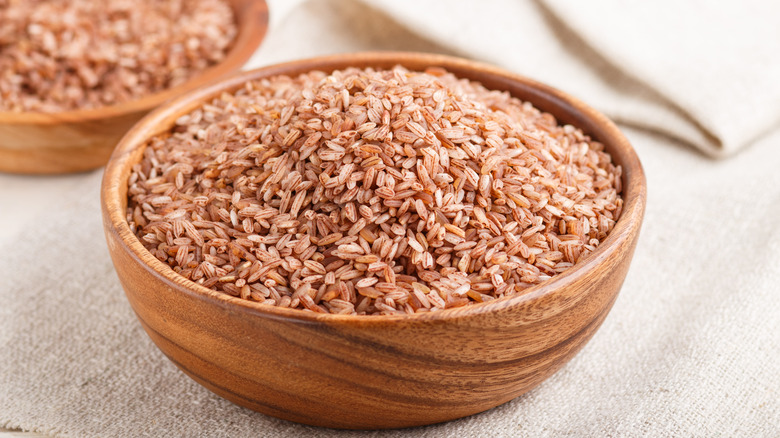Foods Every Man Needs To Have In His Diet
When it comes to men's nutrition, you can't go wrong with choosing whole and unprocessed foods. This conventional wisdom has stood the test of time. By filling up on healthy foods, you are more likely to experience better health and a longer lifespan. Study after study has proven that by eschewing sugary, refined, highly processed choices in favor of these nutritional gems, you are improving the well-being of your heart, lungs, bones, and gastrointestinal tract (via WebMD).
Men have higher calorie and protein needs than women and because of this, they also need higher amounts of certain nutrients, such as magnesium and fiber, Liz Weinandy, a registered dietitian at the Ohio State University Wexner Medical Center, confirmed to U.S. News & World Report. The 2020-2025 Dietary Guidelines for Americans emphasize the need for people to reduce their intake of sugar, sodium, saturated fat, and alcoholic beverages. This is easier to do if you're filling up on nourishing, whole foods regularly throughout the day!
A few handfuls of nuts each week
The protein in food, including nuts, is the building block of muscle and is found in every cell in your body. Nuts themselves have been linked to a lower risk of both diabetes and heart disease. Why? Per The Mayo Clinic, it could be the unsaturated fatty acids, fiber, vitamin E, or plant sterols — or maybe a combination of all of these things. Eating nuts is especially important for men because they develop heart disease 10 years earlier than women (via Johns Hopkins Medicine). Additionally, men generally need more protein than women simply because they often weigh more and have greater lean body mass.
You need a minimum of 0.8 grams of protein for every kilogram (2.2 pounds) that you weigh. So, if you weigh 200 pounds, you need at least 73 grams of protein each day. Remember that this is an absolute minimum; physical activity or illness can dramatically increase needs (via Harvard T.H. Chan School of Public Health). According to CalorieKing, a half-cup of walnuts contains about as much protein as you'll find in a cup of milk; however, it also provides 327 calories, so portion control is advised.
Even though Americans are pretty wild about protein, there is such a thing as too much. "The body can't store protein, so once needs are met, any extra is used for energy or stored as fat," Kristi Wempen, a registered dietitian nutritionist, told the Mayo Clinic.
The fiber in beans is a lifesaver
Eating beans for fiber can help keep cholesterol low, prevent heart disease, and improve GI health, as pointed out by Eating Well. Eating adequate fiber stabilizes blood glucose levels, helping to avoid energy crashes throughout the day. According to a 2016 study in the International Journal of Behavioral Nutrition and Physical Activity, men often skip meals, making this an important consideration. Moreover, fiber may reduce the risk of colorectal cancer, a form of cancer that men are at a slightly increased risk of developing compared to women (via American Cancer Society).
Besides beans, fiber is also found in whole grains, such as oats and whole-wheat bread, various fruits and vegetables, and nuts and seeds. As long as your diet is built around whole, unprocessed foods, you'll almost certainly get enough fiber. A cup of black beans, for example, contains 16 grams of fiber (via CalorieKing). According to the Academy of Nutrition and Dietetics, the average man needs roughly 38 grams of fiber per day.
If you're trying to increase the amount of fiber in your diet, go very slowly and drink plenty of water! This might not be so hard to do because beans are incredibly filling — a real plus for those who want to lose weight. Beans are also a rich source of antioxidants, which help to protect the body from a wide range of diseases, according to the American Cancer Society (via ScienceDaily). If you purchase canned beans, just be sure to rinse them well to remove excess sodium.
Fatty fish is especially good for men
The fatty acids in fatty fish, like salmon, help to prevent atherosclerosis and quell inflammation, which might lessen the chances of experiencing erectile dysfunction, according to research published in Fertility and Sterility. Additionally, inflammation is the root cause of many chronic diseases, including diabetes and heart disease, so keeping a lid on it is key to good health.
Research has also found that omega-3 fatty acids improve erection quality. A 2020 study published in the JAMA Network Open involving over 1,600 subjects found that those who reported using fish oil supplements had larger testes and higher semen volume and quality. Furthermore, they had a more favorable hormone profile for sperm production.
Your body can't make omega-3 fatty acids, so you have to get them either from food or supplements. But if you don't like salmon, you can opt for tuna, mackerel, or trout. Per Healthline, if you don't eat fish at all, you can get omega-3 fatty acids by consuming flaxseed, chia seeds, walnuts, soybean oil, and canola oil. Vegetarians sometimes consume algal oil, an oil made from algae.
Potassium in sweet potatoes is good for the heart and kidneys
Noshing on sweet potatoes gives you the potassium, an important electrolyte, you need for healthy blood pressure levels (via Medical News Today). This vital mineral counteracts the blood-pressure-raising effects of sodium and is crucial for maintaining optimal nerve and muscle function, according to WebMD.
According to a study by the Medical College of Georgia, men develop high blood pressure earlier in life than women do, and it develops more rapidly in younger men (via ScienceDaily). There are complicated biological and genetic reasons for this, but lifestyle plays a part too. Men are more likely to smoke and often eat a high-sodium diet with lots of convenience foods and few fruits and vegetables. All of these are risk factors for hypertension (via HelpGuide).
If you've had kidney stones in the past, you'll want to be especially mindful of your potassium intake, according to the National Institutes of Health Office of Dietary Supplements. Approximately 11% of men will experience kidney stones, while only 6% of women will, according to the National Institute of Diabetes and Digestive and Kidney Diseases. If sweet potatoes aren't your thing, you have a ton of other options. Oranges, bananas, tomatoes, leafy greens, and carrots are other great choices.
Eat leafy greens to possibly increase your testosterone
The magnesium in leafy greens could just increase testosterone levels. It appears that several micronutrients, including magnesium, might increase the serum concentration and the biological activity of testosterone, according to a study in the International Journal of Endocrinology.
Magnesium supplementation in men with testosterone deficiency may help to improve physical performance. Magnesium also plays a prominent role in glucose metabolism and bone health, and getting adequate amounts appears to reduce the risk of type 2 diabetes, congestive heart failure, and stroke, per Oregon State University's Linus Pauling Institute.
Unfortunately, a 2020 study demonstrates half of Americans don't get enough magnesium in their diets, and those who consume a diet rich in fats, refined grains, and sugar are most likely not to get enough (via Pharmacy Times). As we age, our risk of developing magnesium deficiency rises. Magnesium deficiency is most common among those who drink excessive amounts of alcohol, have a condition that causes malabsorption, or have type 2 diabetes (via Linus Pauling Institute).
Folate in foods like Brussels sprouts may improve fertility
Folate in foods like Brussels sprouts isn't only important for women; it might improve fertility in men, according to research published in Fertility and Sterility. You may have seen folate and zinc packaged together. There's a reason for that: These two appear to work well together. In small studies, this combination has been shown to increase sperm concentration in men with fertility problems, although the research is far from conclusive so more studies are needed.
Consider spinach, kale, asparagus, or broccoli if you still suffer unpleasant brussel sprout flashbacks from childhood (via Harvard T.H. Chan School of Public Health). The synthetic form of folate, folic acid, is found in many fortified foods, including bread and breakfast cereal (via Livestrong). Certain conditions affecting the GI tract, such as celiac disease, make folate deficiency more likely, according to the Gluten Intolerance Group. Talk to your doctor before taking any supplements, including folate, which can interact with medication classes, including certain anticonvulsants.
Lycopene in tomatoes may prevent prostate cancer
The lycopene in tomatoes can help to reduce prostate cancer risk. The mechanism behind this risk reduction is still being researched; it may be a cessation of cancer cell growth, the prevention of DNA damage, or an enhancement of the enzymes that break down cancer-causing substances in the body, according to the Memorial Sloan Kettering Cancer Center.
In some studies, although not all, lycopene has been associated with reduced PSA levels (a marker of prostate cancer) and a slower prostate cancer progression as measured by bone scan, as detailed in a systematic review published in Prostate Cancer and Prostatic Diseases.
Lycopene is a powerful antioxidant found in tomatoes, grapefruit, watermelon, and papaya (per MyFoodData). Besides its potential role in preventing prostate cancer, lycopene has also been studied for its beneficial role in benign prostatic hyperplasia (BPH), explained a report in the Annual Review of Food Science and Technology. Although BPH does not cause prostate cancer, the health symptoms can be similar. According to the CDC, "All men are at risk for prostate cancer," so this nutrient could be especially beneficial.
Zinc improves testosterone production and benefits prostate health
The zinc in foods such as chicken is integral for synthesizing proteins throughout the body, testosterone production, and prostate health. Moderate zinc deficiency is associated with testosterone deficiency, and low zinc levels have been linked to decreased sperm production, according to a report published in the Journal of Reproduction and Infertility. As a bonus, people with zinc deficiency are more likely to struggle with acne, so adding zinc-containing foods to your menu might help if you have breakouts, per a review in Dermatology Research and Practice.
Many foods, including snack bars and breakfast cereals, are fortified with a synthetic form of zinc (per Healthline). Animal-based sources of zinc include shellfish, fish, meat, poultry, dairy products, and eggs. Individuals who don't eat these foods can meet their zinc needs by choosing legumes, nuts, seeds, whole grains, and certain vegetables, including mushrooms and kale (per Everyday Health). Overdoing it on zinc supplements can cause nausea and vomiting, so take care not to take too much, a report in the American Journal of Clinical Nutrition advised.
Probiotics as an adjunct for prostate cancer treatment
Yogurt should be a mainstay of everyone's dieft as they contain probiotics, or good bacteria that battle bad bacteria throughout the body. These probiotics help restore the optimal balance of bacteria in the GI system, help your body digest food, and aid in synthesizing vitamins (via Cleveland Clinic).
Per Johns Hopkins Medicine, recent research has found that ingestion of probiotics might help to improve the effectiveness of androgen deprivation therapy used as a prostate cancer treatment. Gut bacteria might also change the anti-tumor effects of other medications used for advanced prostate cancer, such as immunotherapy.
If you ever get bored with yogurt, you could try buttermilk, cottage cheese, kefir, kombucha, tempeh, pickles, cured olives, fermented sauerkraut, miso, or kimchi (via Harvard Health). Don't forget that plain yogurt can be used in place of mayonnaise in foods such as chicken salad and potato salad and makes an excellent base for creamy salad dressings. Contrary to popular belief, not all fermented foods contain probiotics. Sorry to say, beer is not a source of these friendly bacteria, nor is sourdough bread, according to Medical News Today. Some people, including those with a weakened immune system, should not take probiotic supplements without first speaking to their doctor (via Harvard Health).
Try tart cherries to fend off gout and improve your workouts
The anthocyanins in tart cherries help fend off gout, a painful condition more common in men than women and could help your workout routine. Because women naturally have lower uric acid levels, they are at a lower risk for this complex form of arthritis caused by the accumulation of urate crystals in joints (via Mayo Clinic).
As indicated by research published in Therapeutic Advances in Musculoskeletal Disease, consuming tart cherries or their juice may help to reduce uric acid levels and prevent painful bouts of gout. If you're physically active, consuming tart cherries might help you recover quicker and reduce muscle soreness post-workout. If you decide to give it a try before a tough exercise session, consider drinking 10 ounces of tart cherries before strenuous activity and another 10 ounces within a half-hour of ending the exercise (via Today's Dietitian).
The vitamin B12 in your hamburger is good for sperm
Vitamin B12, which is found in foods such as lean ground beef, is important for a healthy nervous system, red blood cell function, and DNA synthesis, according to the National Institutes of Health Office of Dietary Supplements. Men are genetically susceptible to more severe vitamin B12 deficiency compared to women, a paper published in the Annals of Nutrition and Metabolism revealed. This vitamin is especially important for men as studies have shown that vitamin B12 likely increases sperm count, enhances sperm motility, and reduces sperm DNA damage, per an article published in the journal Biomolecules.
Vitamin B12 is only found naturally in animal-based foods, including meat, poultry, fish, eggs, and milk. Individuals who don't eat these foods take supplements, eat fortified foods, and sometimes consume nutritional yeast, a rich source of the nutrient.
As people age, they produce significantly less intrinsic factor in their stomach, causing a sharp decline in the ability to absorb vitamin B12 from food, according to the Office of Dietary Supplements. Older people often take supplements or get vitamin B12 injections to overcome this problem. Symptoms of vitamin B12 deficiency include anemia, fatigue, heart palpitations, pale skin, dementia, weight loss, and infertility. Neurological symptoms, including numbness and tingling in the hands and feet, could become permanent if left untreated (via The Foundation for Peripheral Neuropathy).
Iodine is critically important for men's nutrition
Often ignored, the iodine in seafood such as cod is an essential component of thyroid hormones (via Office of Dietary Supplements). Thyroid disease has been linked to ejaculation issues, erectile dysfunction, and loss of libido in men, according to a review in Sexual Medicine Reviews. Suboptimal iodine intake has been negatively associated with semen concentration and semen counts in some studies, including one published in Biomedical and Pharmacology Journal in 2018.
Secretion of thyroid hormones falls when you consume less than 100 micrograms per day of iodine. If you consume less than 20 micrograms daily, you will develop hypothyroidism and will likely develop goiter (an abnormal enlargement of the thyroid gland), according to the Office of Dietary Supplements. Fatigue, weakness, weight gain, hair loss, dry skin, feeling cold, and suffering memory problems may be symptoms of hypothyroidism (via Cleveland Clinic).
If you're not a fan of cod, you can iodine from seaweed, oysters, shrimp, tuna, eggs, cheese, milk, and, of course, iodized table salt.
The sunshine vitamin in mushrooms increases testosterone production
Vitamin D in mushrooms may increase testosterone levels, according to a 2018 study published in the International Journal of Endocrinology. Low testosterone in men can cause a low sex drive, fatigue, reduced muscle mass, irritability, erectile dysfunction, and depression, explained the Urology Care Foundation.
Unfortunately, it's been estimated that 40% of adults are deficient in the so-called "sunshine" vitamin, per an article published in Cureus. Indeed, vitamin D is made from cholesterol in your skin when it's exposed to the sun. Individuals with darker skin need more time in the sun than those with lighter skin, and a large swath of the country is too far from the sun to get any positive effects from it for more than half of the year (via Healthline).
Few foods contain vitamin D. These include the flesh of fatty fish, beef liver, egg yolks, and cheese. Mushrooms treated with UV light provide some of the highest levels of vitamin D. Breakfast cereals, some brands of orange juice, margarine, and other food products are often fortified with vitamin D, according to the National Institutes of Health Office of Dietary Supplements.
Niacin in brown rice is good for the heart and sexual well-being
The niacin in brown rice is potentially good for erectile dysfunction. According to a study published in the Journal of Sexual Medicine, niacin lowers lipid levels and improves erectile function in men suffering from moderate to severe erectile dysfunction and dyslipidemia. Per MedlinePlus, doctors often prescribe niacin to decrease the risk of a second heart attack in individuals who already suffered one heart attack and who have high cholesterol, to prevent worsening of atherosclerosis, and to reduce the level of triglycerides in the blood.
High cholesterol levels are strongly correlated to erectile dysfunction, according to Medical News Today. It's not that the two cause each other, but rather that both conditions have the same underlying cause: inflammation of the blood vessels (via Circulation).
In addition to rice, niacin can be found in mushrooms, green peas, avocados, and sweet potatoes (via Verywell Fit). Keep in mind that megadosing on niacin supplements is not recommended and can cause rapid heartbeat, abdominal pain, and severe flushing accompanied by dizziness (via Mayo Clinic).



